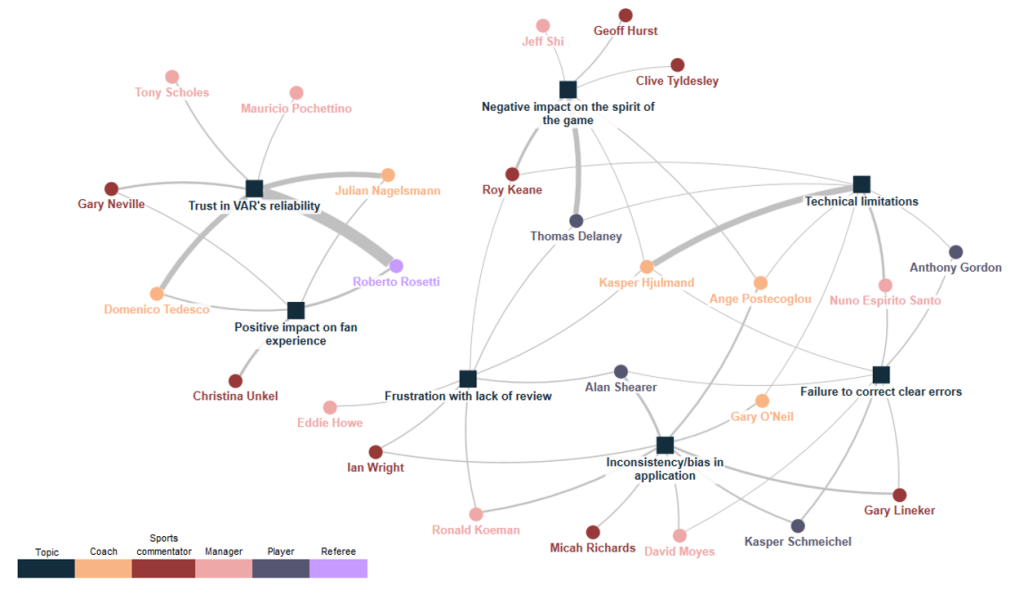While a cluster of football managers support the narrative that VAR is reliable and necessary, fans are not so convinced.
Football’s hot topic
The introduction of VAR (Video Assistant Referees) in 2019 was initially welcomed, with naked-eye refereeing decisions often proving detrimental in games and many branding football “outdated”.
However, the criticisms quickly started piling up: from subjective interpretation of clear and obvious errors, and disruptive delays in gameplay, to the technology’s tendency to scrutinise marginal offside decisions, often resulting in goals being disallowed for tiny infractions not easily discernible in real-time.
This has ultimately led to frustration among players, fans, and officials alike, undermining the spontaneous and emotional aspects of the sport while also diminishing the authority of on-field referees and fostering an environment of contentious debate over the role and impact of VAR.
At Euro 2024, VAR has so far led to 24 total overturns, which naturally gave rise to many controversies.
In light of this, we used our advanced media analytics, melding AI with human expertise, to see how VAR has been perceived during the Euros.
Here’s what we found:
1. Football managers spread trust in VAR’s reliability
Our analysis of nearly 400 Euro-related articles published in English, German, Italian, Spanish and French in the last 30 days showed that the trust in VAR’s reliability was the narrative that gained the biggest share of voice in the debate:
Our mapping analysis revealed that this narrative was supported by some of the most influential commentators in the debate, primarily managers and coaches, such as UEFA managing director of refereeing Roberto Rosetti, Julian Nagelsmann, manager of the Germany national team, and Domenico Tedesco, the head coach of the Belgium national team.
This is illustrated on the map below, which shows the links between the topics in the media debate (represented by squares) and the commentators (represented by circles and colour-coded by role).

These commentators also supported the narrative that VAR has a positive impact on fan experience, as it aimed to enhance viewers’ understanding of the game.
2. Sports commentators and players share many critiques
As seen on our map, the trust in VAR’s reliability and positive impact on fan experience narratives formed a distinct cluster in the discussion, while criticisms against VAR were much more interconnected among sports commentators and players.
For example, sports pundits Gary Lineker and Ian Wright expressed strong public frustration over VAR decisions that appeared inconsistent, with some incidents being reviewed and others not, leading to accusations of failure to correct errors.
Meanwhile, players such as Anthony Gordon and Thomas Delaney were quoted as criticising VAR’s technical limitations, with issues such as camera angles and frame rates leading to contentious decisions. Delaney was also particularly vocal on VAR’s negative impact on the spirit of the game, emphasising that the emotional investment and pride of playing for your country were undermined by VAR’s controversial rulings.
3. Fans are also not convinced
Our analysis of 2,397 Reddit posts in Euro 2024 fan discussions showed that fans, much like many commentators and players, expressed significant frustration with VAR, with the primary concern being how it disrupts the natural flow of the game and causes delays, particularly because of the time it takes for VAR to make decisions.
But beyond this more or less obvious concern, many fans also shared the scepticism seen among sports commentators and players: they were unconvinced in VAR’s accuracy, pointing out instances where they felt VAR made controversial or incorrect decisions.
Inconsistency in how VAR was applied across different matches is another major concern, as fans felt that similar situations are not always handled in the same way, leading to perceptions of bias and unfairness.
These sentiments were posted in general Reddit threads about the Euros and the use of VAR, but many fans also expressed them when discussing specific games.
For instance, when discussing the Germany vs. Denmark game, fans expressed significant distrust in VAR, with 31% of the comments highlighting how it led to inaccurate decisions.
This reaction reflected key moments in the match, such as the contentious penalty awarded to Germany after a handball call against Denmark, which was highly debated among fans and pundits alike. The handball decision led to intense scrutiny, as many felt it was a harsh call that changed the game’s momentum.
As a whole, there was limited acknowledgement among fans that VAR can be reliable in making correct decisions. Some users appreciated the technology’s role in ensuring accuracy and reducing instances of cheating, noting that it can deter players from diving or other dishonest actions.
The bottom line: VAR has to be rebranded
It seems VAR is here to stay in football. And while some professional football managers and coaches do a good job explaining its positives in the media, football associations can do a better job of understanding fans’ concerns – a task where advanced human-enriched media analytics can be invaluable.
For instance, our case study found that fans frequently express frustration over VAR’s disruption of the game’s flow, perceived inconsistencies and controversial decisions.
To address these issues, it is crucial for football associations to adopt a strategy of total transparency. This means not only releasing VAR footage but also providing detailed dialogue between the referee and the VAR team, explaining why decisions are made. Much like how F1 broadcasts driver-team communications to give fans complete insight, football can similarly open its doors to the inner workings of VAR.
This level of transparency can help demystify the process, address fans’ scepticism, and ultimately improve VAR’s reputation among the broader football community.
Want to boost your comms strategy? Discover how Commetric’s expert-driven approach and tailored services can empower you to master your media presence and make business-critical decisions.
Photo credit: Freepik
